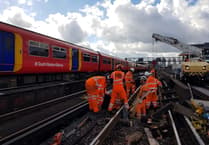THOUSANDS of elderly and vulnerable residents who rely on the Bustler bus services are facing a bleak future if the funding cuts tabled by Woking Borough Council are imposed.
The familiar bright yellow vehicles are run by Woking Community Transport (WCT) to provide door-to-door transport to and from community centres and the Dial-A-Ride mobility service.
WCT has been told its service level agreement, worth £175,000, is under threat as part of the £11m council cuts.
“There are dark days ahead,” said Guy Padfield-Wilkins, managing director and chief executive of WCT. “The funding that we used to receive is not going to be renewed after April 1.
“It’s devastating. We have just under 4,000 members, all of whom are either disabled or have reduced mobility. People have said they wouldn’t get out of the house if it wasn’t for us.”
The service has been running for 33 years with its biggest user base people in their late 70s and beyond.
“I don’t know what the option is for them,” said Guy. “Even for those who can afford taxis, it’s not going to be viable. We help people get out of their chairs, perhaps help them get dressed to go out in the winter, help them to get into the vehicles. What are people who use us going to do?
“Without the funding we just can’t continue to run the service.”
Service users register as members at no charge and pay a heavily-subsidised fare door to door.
Guy said: “Remember, too, that funding for the town-centre buggy ended on March 31 this year, reducing accessibility throughout the town centre for those with reduced mobility.”
In these days of consultations, WCT conducted its own survey among its users about the potential loss of the Bustler services.
“I’m sickened to think that Bustler may disappear,” reads one response. “You do a wonderful service, and residents like myself will be lost.”
Another says: “I am 93, my wife is 87. We rely entirely on Bustler for our many appointments at Ashford, St Peter’s and Woking hospitals. There is no direct bus service to any of these hospitals and, if there was, we would still require help to and from bus stops.”
Others touch on the importance of social inclusion.
“Without Dial-A-Ride, I would be unable to go to Woking for doctor’s appointments, banking, food and clothing,” the user says.
“To me, it is a lifeline that gives me some independence. Going out on the Bustler is necessary for my mental health, enabling me to experience something other than just my home.
“It lets me have contact with others. It’s inconceivable that this service should even be considered as one that isn’t essential.”
“I live on my own, it gives me a chance to chat and access things I wouldn’t otherwise be able to get to, eg painting class for which I need to take equipment.”
Guy’s file bulges with more of the same thoughts.
“I don’t blame the current council management,” he said. “It’s a legacy from when many of them weren’t even on the council.
“But I do want them to understand the impact of the cuts. Local residents really need the service.
“Many of them are in their 80s and 90s. They’re not users of social media, they don’t have a voice and that’s what I want to give them.”





Comments
This article has no comments yet. Be the first to leave a comment.